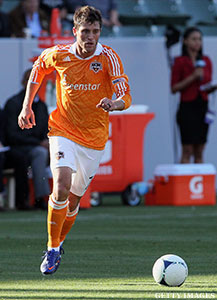Colin Clark is a 27-year-old midfielder for the Houston Dynamo. He's a pretty good player, now with his second MLS club, and he's even earned one cap with the United States National Team. In the general American scope, Colin Clark is a talented soccer player. Colin Clark may also be a homophobe -- or he might not be. I don't know the answer, but I do know that he did this on Saturday:
Yes, the ball boy rolled the ball back to Clark instead of just handing it to him. Who knows why he did that? This made Clark angry as he, presumably, wanted to throw the ball in at his own convenience, so he called the ball boy a "f***ing f***ot." Removed from anything, this is a terrible thing to say. And sure, Clark was in the middle of a game, his patience short, so he said what he shouldn't have said.
Soon after the incident, Clark apologized numerous times on Twitter. The MLS, very quizzically, pulled the video from YouTube because of supposed "rights reasons." And on Wednedsay the league suspended Clark for three games and fined him an undisclosed amount. He will also be required to attend diversity and sensitivity training.
MLS commissioner Don Garber released the following statement:
Clark also released a statement of his own:

Sure, that's all well and good. Three games is a pretty substantial chunk, while the undisclosed fine is undisclosed because, well, the MLS can't really afford to fine its players that much when they're not making all that much money to begin with. So it's easier to just leave it at that.
When video of Clark's slur began to surface, people were understandably very angry. A general consensus was that the league needed to "make a statement." Some went so far as to call this a "possible teaching moment" for the league. That's all great. Homophobia is a terrible thing, and the league should not tolerate it, but is that really how we need to talk about this?
Not being a homophobe is a basic requirement to qualify as a decent human being. That should be simple enough to understand. The league expects its players to meet a certain base level of human decency, which is totally fair, and when that's not met, it hands out something like a three-game suspension. They don't need to "set an example" or teach anyone anything. It should expect its players to be tolerant people and have a standard for that. At the same time, it shouldn't have to be praised for doing that. You don't teach people not to be bad people; you expect them not to be. It's really not asking for too much.
Back when Kobe Bryant and Joakim Noah made similar homophobic remarks last spring, the NBA was praised for the great job it did in swiftly doling out fines to both players. (Neither was suspended, but the fines are surely way bigger than whatever Clark has to pay.) Rather, the NBA just did its job in that this job, like most other jobs, includes not tolerating bigoted speech.
It's disheartening, all this. It's disheartening that it happened in soccer, what's supposed to be America's most worldly, most welcoming game. (Granted, world soccer isn't even close to being above racism or bigotry, but the sport takes on a different role in the U.S.) And it's disheartening that things like this even exist, but a lot of terrible things still happen in this country -- and around the world -- that don't make much sense. It's terrible that a punishment even needs to be handed out, but that's what needs to be done, and that's all that needs to be done. A teaching moment or an example-making fine isn't going to make any of this disappear. When we can finally realize that, maybe we'll have taken a tiny step toward actually making it start to go away.
-- Follow Ryan O'Hanlon on Twitter @rwohan.
Popular Stories On ThePostGame:
-- The Hottest New Running Trend: Bandit Racing
-- Train Smarter: The Truth About Swiss Balls
-- Coregasm Phenomenon Is Confirmed By New Scientific Study
-- Why Charles Barkley Is Wearing A Dress








